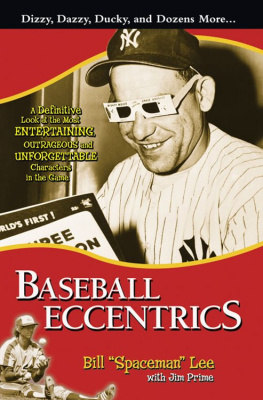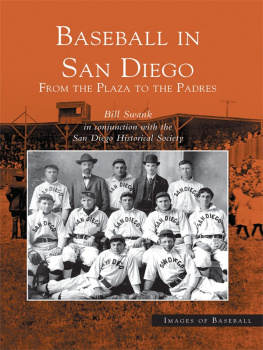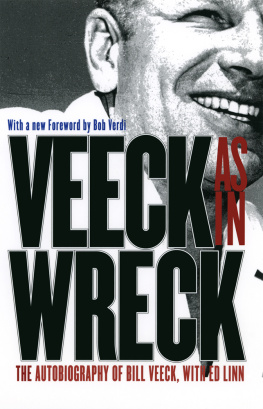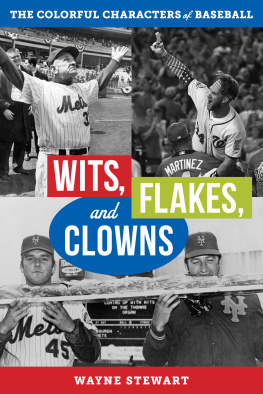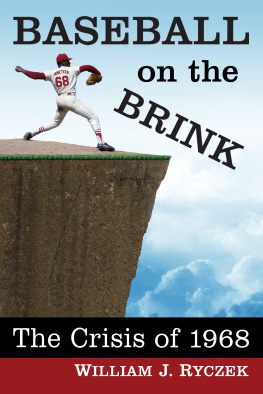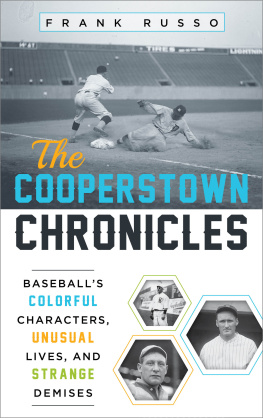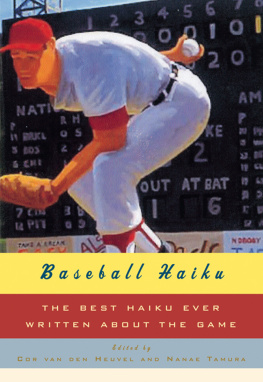Acknowledgments
Bill and I would like to thank all those wonderful ballplayers, past and present, who made this book so much fun to write. The toughest part was having to stop writing. The well of characters seemed bottomless, and just when we thought wed heard it all, we discovered yet another great story that begged to be told. We were constantly saying to each other, Boy, you dont see that every day, to the point that it became our daily rallying cry and mantra.
We would also like to sincerely thank Triumph Books for believing in this project from the beginning and helping to bring it to fruition. In particular, thank you to Tom Bast, Kelley White, and Amy Reagan for giving us free rein to make it our book.
Thanks also to our families, who were our sounding boards as we decided which stories should stay and which should go.
And finally thank you, baseball, for being an eccentric game and a breeding ground for eccentricity. You have made both our lives infinitely richer.
* * *
A special thank you to Bill Lee. Writing this book with Bill has been an experience Ill never forget. Just when you think youve covered a subject from every possible angle, Bill comes up with a fresh perspective. Its what made him a great major league pitcher and its what makes him a great read. I have now worked with Ted Williams and Bill, and I consider it a distinct privilege in each case. I sincerely hope that I will see the day when Bill is inducted into the Boston Red Sox Hall of Fame, where he belongs, and is welcomed back into the Major League fold, where he could add so much to the game we all love.
Jim Prime
* * *
My relationship and collaboration with Jim Prime in writing this book is like synergy. Its like adding molybdenum to cobalt steel, where the tensile strength increases tenfold. Thats synergy. The whole is greater than the sum of its parts.
Bill Lee
Sources
Allen, Maury. Bo . The Dial Press: New York, 1973.
Bouton, Jim with Neil Offen. I Managed Good, But Boy Did They Play Bad. Playboy Press: Chicago, 1973.
Broeg, Bob. Super Stars of Baseball . The Sporting News, 1971.
Coffin, Thomas P. The Old Ball Game . Herder and Herder, 1971.
Creamer, Robert W. Babe: The Legend Comes to Life . Simon and Schuster: New York, 1974.
Daley, Arthur. Inside Baseball . Grosset and Dunlap, 1950.
Durant, John. The Story of Baseball . Hastings House, 1949.
Ford, Whitey; Mickey Mantle; and Joe Durso. Whitey and Mickey . Viking Press: New York, 1977.
Gleason, Paul. Uleta Blues & Haikus: Songs, Poetry, Sketches . Skuwampas Press: Palm Desert, California, 2006.
Honig, Donald. Baseball Between the Lines . Coward, McCann & Geoghegan, 1976.
Johnstone, Jay, and Rick Talley. Over the Edge . Contemporary Books: Chicago, 1987.
Johnstone, Jay, with Rick Talley. Temporary Insanity . Contemporary Books: Chicago, 1985.
Kiersh, Edward. Where Have You Gone, Vince DiMaggio? Bantam Books: New York. 1983.
Lyle, Sparky, and Peter Golenbock. The Bronx Zoo . Triumph Books: Chicago, 2005.
McDermott, Mickey, and Howard Eisenberg. A Funny Thing Happened on the Way to Cooperstown . Triumph Books: Chicago, 2003.
Meany, Tom. Baseballs Greatest Pitchers . A.S. Barnes, 1951.
Nash, Bernie, and Allan Zullo. The Baseball Hall of Shame . Pocket Books/Simon and Schuster: New York, 1987.
Nash, Bruce; Allan Zullo; and Bernie Ward. The Sports Hall of Shame . Archway Paperbacks, 1990.
Nettles, Graig, and Peter Golenbock. Balls . G.P. Putnams Sons: New York, 1984.
Paige, Leroy. Maybe Ill Pitch Forever. Doubleday: New York, 1962.
Schacht, Al. Clowning Through Baseball . A.S. Barnes: New York, 1941.
Smith, Red. Red Smiths Favorite Sports Stories . W.W. Norton, 1975.
Thorn, John; Phil Birnbaum; and Bill Deane. Total Baseball . Sport Classic Books: Wilmington, Delaware, 2004.
Copyright 2007 by Bill Lee and Jim Prime
No part of this publication may be reproduced, stored in a retrieval system, or transmitted in any form by any means, electronic, mechanical, photocopying, or otherwise, without the prior written permission of the publisher, Triumph Books, 542 South Dearborn Street, Suite 750, Chicago, Illinois 60605.
Library of Congress Cataloging-in-Publication Data
Lee, Bill, 1946
Baseball eccentrics : the most entertaining, outrageous, and unforgettable characters in the game / Bill Lee with Jim Prime.
p. cm.
Includes bibliographical references.
ISBN-13: 978-1-57243-953-5
ISBN-10: 1-57243-953-X
1. Baseball playersUnited StatesAnecdotes. 2. BaseballUnited StatesAnecdotes. I. Prime, Jim. II. Title.
GV873.L44 2006
796.3570922dc22
[B]
2006033404
This book is available in quantity at special discounts for your group or organization. For further information, contact:
Triumph Books
542 South Dearborn Street
Suite 750
Chicago, Illinois 60605
(312) 939-3330
Fax (312) 663-3557
Printed in USA
ISBN: 978-1-57243-953-5
eISBN: 978-1-61749-926-5
Design by Amy Carter
All photos courtesy of AP/Wide World Photos unless otherwise indicated.
Introduction: Presenting My Credentials
The opposite of eccentric is conventional, normal, average. Thats why I love to be called an eccentric ballplayer. Its actually a high compliment because baseball is the most eccentric of games. In order to play it well, you have to grasp that fact. Let so-called normal people play the normal games. Were in tune with the rhythms of the game. We stop and smell the roses. (I stopped and smelled Pete Rose on the way to second one day and got tagged out, but thats another story.)
You cant play the game if you dont recognize that it offers infinite possibilities for the bizarre. Heres an example. In what other sport could I have pissed off my own manager and the opposing manager at the same time? I was pitching a game against the Chicago White Sox in a driving rain and threw 14 straight slow curveballs. During the course of that, both managers simultaneously came to the top step of their respective dugouts and started yelling at me. It was one of the most amazing things in the world. I had managed to offend them both. My manager, Eddie Kasko, thought I should mix up my pitches, and Chuck Tanner thought I was disrespecting his Chicago White Sox. Ask Tanner, he was there. He was yelling, You son of a bitch, quit showing up my hitters! And Kasko was saying, You cant throw that many curveballs in a row! I was getting it in stereo.
Bill Melton was the last out of the game. He hit a line drive off my chest, and the ball fell toward the third-base side. I went down and got it, threw underneath my arm to first base for the last out, slid in the rain across the rain-soaked infield, and lay there like in the Shawshank Redemption . I got a standing ovation. It was a complete- game win and in the last three innings I threw nothing but slow curveballs. Why? Because the rain was coming down in such a way that when the hitters looked up they got rain in their eyes and had to blink. I factored that into my strategy, but neither manager liked it. One hated me and the other couldnt believe his eyes. They thought I should go by the book. They both were basically saying, You cant play the game that way, even though it worked! And they call me bizarre. They call me eccentric. Why should I do hitters a favor by throwing fastballs when I can team up with Mother Nature and gain a huge advantage?
You cant play the game the same way every day. Every day you go out and play the game and have to realize the infinite possibilities that await you. Every day is different. How many times in the run of a season do you say, Boy, I never saw that one before? It happens all the time every day you go to the ballpark. Thats what makes the game great.
Next page
